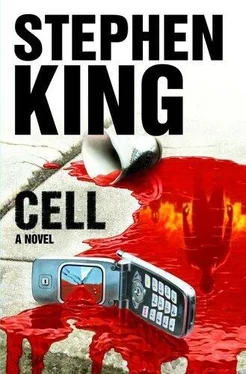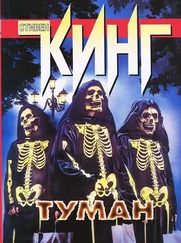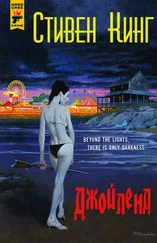"My best guess would be that the generator at the Safeway in the Center just gave up," Tom said. "There's probably a battery-powered alarm in case that happens, because of all the perishables. But that's only a guess. For all I know, it's the First Malden Bank and T—"
"Look!" Alice said.
The woman stopped in the act of plucking another tomato, got up, and walked toward the east side of Tom's house. George got to his feet as she passed, and Clay was sure he meant to kill her as he had the old man. He winced in anticipation and saw Tom reaching for Alice, to turn her away. But George only followed the woman, disappearing around the corner of the house behind her.
Alice turned and hurried toward the kitchen door.
"Don't let them see you!" Tom called in a low, urgent voice, and went after her.
"Don't worry," she said.
Clay followed, worrying for all of them.
They reached the dining room door in time to watch the woman in her filthy pants suit and George in his even filthier coverall pass beyond the dining room window, their bodies broken into segments by Venetian blinds which had been dropped but not closed. Neither of them glanced toward the house, and now George was so close behind the woman that he could have bitten the nape of her neck. Alice, followed by Tom and Clay, moved up the hall to Tom's little office. Here the blinds were closed, but Clay saw the projected shadows of the two outside pass swiftly across them. Alice went on up the hall, toward where the door to the enclosed porch stood open. The comforter lay half on and half off the couch, as Clay had left it. The porch was flooded with brilliant morning sunshine. It seemed to burn on the boards.
"Alice, be careful!" Clay said. "Be—"
But she had stopped. She was just looking. Then Tom was standing beside her, almost exactly the same height. Seen that way, they could have been brother and sister. Neither of them took any pains at all to avoid being seen.
"Holy fucking shit," Tom said. He sounded as if the wind had been knocked out of him. Beside him, Alice began to cry. It was the sort of out-of-breath weeping a tired child might make. One who is becoming used to punishment.
Clay caught up. The woman in the pants suit was cutting across Tom's lawn. George was still behind her, matching her stride for stride. They were almost in lockstep. That broke a little bit at the curb when George swung out to her left, becoming her wingman instead of her back door.
Salem Street was full of crazy people.
Clay's first assessment was that there might be a thousand or more. Then the observer part of him took over—the coldhearted artist's eye– and he realized that was a wild overestimate, prompted by surprise at seeing anyone at all on what he had expected would be an empty street, and shock at realizing they were all them. There was no mistaking the vacant faces, the eyes that seemed to look beyond everything, the dirty, bloody, disheveled clothing (in several cases no clothing at all), the occasional cawing cry or jerky gesture. There was the man dressed only in tighty-whity undershorts and a polo shirt who seemed to be saluting repeatedly; the heavyset woman whose lower lip was split and hung in two beefy flaps, revealing all of her lower teeth; the tall teenage boy in blue jeans shorts who walked up the center of Salem Street carrying what looked like a blood-caked tire-iron in one hand; an Indian or Pakistani gentleman who passed Tom's house wriggling his jaw from side to side and simultaneously chattering his teeth; a boy—dear God, a boy Johnny's age—who walked with absolutely no sign of pain although one arm was flapping below the knob of his dislocated shoulder; a pretty young woman in a short skirt and a shell top who appeared to be eating from the red stomach of a crow. Some moaned, some made vocal noises that might once have been words, and all were moving east. Clay had no idea if they were being drawn by the braying alarm or the smell of food, but they were all walking in the direction of Malden Center.
"Christ, it's zombie heaven," Tom said.
Clay didn't bother answering. The people out there weren't exactly zombies, but Tom was pretty close, just the same. If any of them looks over here, sees us and decides to come after us, we're done. We won't have a hope in hell. Not even if we barricade ourselves in the cellar. And getting those guns across the street? You can forget that.
The idea that his wife and son might be—very likely were —having to deal with creatures such as these filled him with dread. But this was no comic book and he was no hero: he was helpless. The three of them might be safe in the house, but as far as the immediate future was concerned, it didn't look like he and Tom and Alice were going anywhere.
14
" They're like birds," Alice said. She wiped the tears from her cheeks with the heels of her hands. "A flock of birds."
Clay saw what she meant at once and gave her an impulsive hug. She had put her finger on something that had first struck him as he'd watched George the mechanic follow the woman instead of killing her, as he had the old man. The two of them clearly vacant in the upper story, yet seeming to go out front by some unspoken agreement.
"I don't get it," Tom said.
"You must have missed March of the Penguins," Alice said.
"Actually, I did," Tom said. "When I want to see someone waddle in a tuxedo, I go to a French restaurant."
"But haven't you ever noticed the way birds are, especially in the spring and fall?" Clay asked. "You must have. They'll all light in the same tree or along the same telephone wire—"
"Sometimes so many they make it sag," Alice said. "Then they all fly at once. My dad says they must have a group leader, but Mr. Sullivan in Earth Science—back in middle school, this was—told us it was a flock-mind thing, like ants all going out from a hill or bees from a hive."
"The flock swoops right or left, all at the same time, and the individual birds never hit each other," Clay said. "Sometimes the sky's black with them and the noise is enough to drive you nuts." He paused. "At least out in the country, where I live." He paused again. "Tom, do you . . . do you recognize any of those people?"
"A few. That's Mr. Potowami, from the bakery," he said, pointing to the Indian man who was wriggling his jaw and chattering his teeth. "That pretty young woman . . . I believe she works in the bank. And do you remember me mentioning Scottoni, the man who lives on the other side of the block from me?"
Clay nodded.
Tom, now very pale, pointed to a visibly pregnant woman dressed only in a food-stained smock that came down to her upper thighs. Blond hair hung against her pimply cheeks, and a stud gleamed in her nose. "That's his daughter-in-law," he said. "Judy. She has gone out of her way to be kind to me." He added in a dry, matter-of-fact tone: "This breaks my heart."
From the direction of the town center there came a loud gunshot. Alice cried out, but this time Tom didn't have to cover her mouth; she did it herself. None of the people in the street glanced over, in any case. Nor did the report—Clay thought it had been a shotgun—seem to disturb them. They just kept walking, no faster and no slower. Clay waited for another shot. Instead there was a scream, very brief, there and gone, as if cut off.
The three standing in the shadows just beyond the porch went on watching, not talking. All of the people who passed were going east, and although they did not precisely walk in formation, there was an unmistakable order about them. For Clay it was best expressed not in his view of the phone-crazies themselves, who often limped and sometimes shambled, who gibbered and made odd gestures, but in the silent, ordered passage of their shadows on the pavement. They made him think of World War II newsreel footage he'd seen, where wave after wave of bombers flew across the sky. He counted two hundred and fifty before giving up. Men, women, teenagers. Quite a few children Johnny's age, too. Far more children than old people, although he saw only a few kids younger than ten. He didn't like to think of what must have happened to the little guys and gals who'd had no one to take care of them when the Pulse occurred.
Читать дальше








